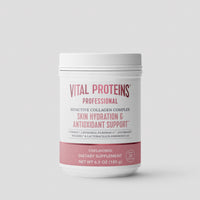By: Tess DiNapoli
Is your skin dehydrated or is it simply dry? Understanding the difference is simple once you break it down to the fundamentals. Dry skin is a skin type. You may have dry skin because your mother or grandmother had it, for example; it can be genetic. Dehydrated skin, however, is a condition, which means that it can affect anyone. You can have a dry skin type and still experience dehydration. Dry skin occurs because you lack natural oils and sebum. Dehydration kicks in when your skin lacks water.
While it's not exclusive to summertime, you run the risk of dehydrating your skin any time it's hot outside. In addition to neglecting your water intake, it's typically caused by sun damage, changes in the weather, hard water, and even your air conditioning. It's easy to conflate the two, but confusing them can prevent you from fulfilling the needs of your skin. With each sign and symptom, it's telling you what's wrong and exactly what it needs. Once you solve your dehydration problem, you can get back to enjoying plump, moisturized skin that's healthy from the inside, out.
The Common Signs of Dehydration
Dry skin is a problem all its own, but it presents with symptoms that are distinctly different from dehydration. While a solid skincare routine can effectively battle dry skin, you still need a bit more to quench it. Dehydration occurs when the upper layers of your skin lose water. It causes your skin to appear dull and even lifeless. It also results in a tight feeling. Your skin may feel like it's a size or two too small, and you'll notice that it feels like it stretches any time you yawn, open your mouth, or even blink your eyes. Your complexion will appear tired as well. According to Sevana Petrosian, CEO and Owner of Med Spa Sev Laser, your skin won't necessarily feel dry to the touch, but it may feel rough, as if it's parched. “It's not uncommon to spot under-eye circles, sunken eyes, and the appearance of shadows around your face either,” she adds. Now that you know the signs, you're in the perfect position to fix the issue.

Incorporate Hyaluronic Acid
Skin-saving ingredient hyaluronic acid (HA) is a must-have if maintaining skin moisture levels is your goal. “There are a lot of estheticians out there in the medical world that have been trained to have their patients not use a moisturizer and instead recommend a product like hyaluronic acid that repairs and creates the body’s own moisture levels,” says Holly Sheppard, a licensed esthetician and cosmetic laser technician at Dr. Shaun Parson Plastic Surgery & Skin Center. Want to nourish your inner glow? Try Vital Proteins Hyaluronic Acid Super Surge capsules, which contains 120mg of Hyaluronic Acid, 2x Daily Value Vitamin C and 5x Daily Value Biotin.
Pamper Yourself
Pampering your skin can help, too. Of course, you could argue that all of these remedies will pamper your skin. Go a step beyond and book an appointment for a hydrafacial, a quick 3-step treatment that will leave your skin glowing and hydrated. Don't believe us? Watch our social media coordinator, Liz Holtzman, try it herself at SpaDerma at Chicago's West Loop location.
Get H2O Happy
One of the most fool-proof ways to treat dehydration is to drink more water. Most of us don't drink nearly enough, so it's no surprise that we wind up dehydrated. That's especially true once the weather begins to get warmer. Start with the standard and try to drink at least eight glasses of water each day. However, you have to be just as careful to avoid ingesting too much water, which may cause you to lose precious minerals. Want a more flavorful option? We suggest trying our very own collagen drink a.k.a. Vital Proteins Collagen Water (available in Strawberry Lemon, Blackberry Hibiscus, Original, and Blueberry Mint flavors) as a way to combat dehydration.
RELATED: An Esthetician's Tips for the Best At-Home Facial
Eat It Up
Try as we might, it's still difficult to drink the recommended daily amount of water. Diversify by introducing water-rich fruits and vegetables into your diet, such as celery, cucumbers, and watermelon. Steer clear of fruits that have too much sugar. You can turn to veggie supplements, as well, like our Collagen Beauty Greens, which can be added to smoothies and recipes.
Shield Your Skin from the Sun
Because sun damage can cause dehydration, take care to protect yourself any time you're outside. In addition to wearing a sun hat and covering your arms and legs when you can, it’s also recommended to slather on the SPF. For the sake of ease and convenience, you might want to think about a handy sunscreen spray.
Don't mistake dehydration for dry skin. Remember to hydrate as often as possible. Your skin will thank you for it.













